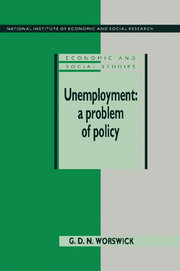Book contents
- Frontmatter
- Contents
- List of tables
- List of charts
- Preface
- 1 INTRODUCTION
- 2 CONCEPTS AND MEASUREMENTS
- PART 1 STRUCTURAL CHANGE
- PART 2 THE WAGE QUESTION
- PART 3 MACROECONOMIC POLICY
- 12 THE THEORETICAL BACKGROUND
- 13 EVIDENCE RELATING TO THE ECONOMY
- 14 EVIDENCE RELATING TO POLICY
- 15 REFLECTIONS ON MACROECONOMIC POLICY
- PART 4 INTERNATIONAL DIMENSION
- Appendix to Chapter 8: The puzzle of the apparent fall in United States real wages
- Notes
- List of works cited
- Index
- THE NATIONAL INSTITUTE OF ECONOMIC AND SOCIAL RESEARCH PUBLICATIONS IN PRINT
14 - EVIDENCE RELATING TO POLICY
from PART 3 - MACROECONOMIC POLICY
Published online by Cambridge University Press: 06 July 2010
- Frontmatter
- Contents
- List of tables
- List of charts
- Preface
- 1 INTRODUCTION
- 2 CONCEPTS AND MEASUREMENTS
- PART 1 STRUCTURAL CHANGE
- PART 2 THE WAGE QUESTION
- PART 3 MACROECONOMIC POLICY
- 12 THE THEORETICAL BACKGROUND
- 13 EVIDENCE RELATING TO THE ECONOMY
- 14 EVIDENCE RELATING TO POLICY
- 15 REFLECTIONS ON MACROECONOMIC POLICY
- PART 4 INTERNATIONAL DIMENSION
- Appendix to Chapter 8: The puzzle of the apparent fall in United States real wages
- Notes
- List of works cited
- Index
- THE NATIONAL INSTITUTE OF ECONOMIC AND SOCIAL RESEARCH PUBLICATIONS IN PRINT
Summary
In studying the behaviour of the economy, we were looking for statistical generalisations, though the results were not always conclusive. With macroeconomic policies, there may be some questions, for example, stabilisation, where it is, in principle, sensible to look for generalisation, but, as a rule, the particular circumstances of economies at particular times make it unlikely that the general approach will be very fruitful. Much of this chapter will, accordingly, be historical and discursive.
In retrospect, the postwar development of the advanced economies seems to have had two phases. In the first phase, priority was given (in varying degrees) to the maintenance of employment and, in most cases, not only was this achieved but output grew at higher rates than ever previously experienced. In Britain, GDP grew between 1951 and 1973 at an annual average rate of 2.8 per cent, which implies a doubling in every 25 years. This was low by comparison with European countries and Japan, but was faster than in any period of comparable length since at least the middle of the last century. More striking still, productivity, that is, output per man year, was already rising at 2 per cent a year in the 1950s, and was to rise faster still in the 1960s. But Matthews and his colleagues (Matthews, et al. 1982) have also shown that ‘… the postwar period is unique in British history (since the time of James I) in having a sustained and substantial rise in prices’.
- Type
- Chapter
- Information
- Unemployment: A Problem of PolicyAnalysis of British Experience and Prospects, pp. 152 - 173Publisher: Cambridge University PressPrint publication year: 1991

